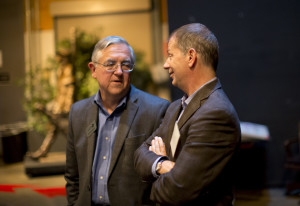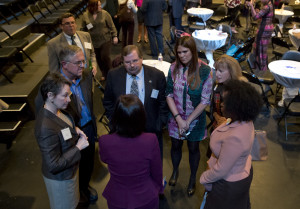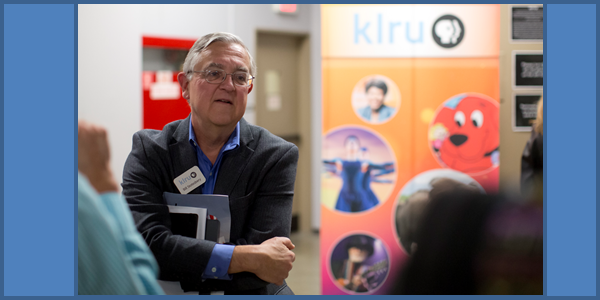
By: Elizabeth McGuire
KLRU-TV, Austin’s venerable public television station known for shining a light on new artists and new ideas, has been guided the last 12 years by someone likely to avoid a spotlight cast his way. It’s just not Bill Stotesbery’s style.
Originally from Pittsburgh, Stotesbery earned a B.A. in Communications from Texas Christian University, then headed to the University of Texas for his Master’s from the LBJ School of Public Affairs.
He has spent more than 30 years in a variety of communications positions, first in the public sector, then in public relations and public affairs. He is now the CEO of KLRU-TV and oversees operations at the 50-year-old organization.
Stotesbery was in Leadership Austin’s first Essential Class in 1980 and later served as the organization’s alumni chair, curriculum chair and board chair. He has served on numerous non-profit boards, including the Greater Austin Chamber of Commerce, the Texas Department of Information Resources, and the Texas Center for Educational Technology at the University of North Texas.
Stotesbery has lived in Austin long enough to be jaded about the changes he has seen, but he is refreshingly philosophical and practical about how the city is growing and evolving around us.
You’ve been in communications most of your whole career? What drew you to this field?
When I was much younger, before college, I was always involved in speech/debate/student government and things of that nature. So dealing with the process of communication was always something I did. Such as trying to figure out how to make complicated things simpler; or trying to figure out how to make things that aren’t well defined, better defined; or make some form out of some puff of smoke. These were always something I enjoyed and so that became a big part of my career once I got out of graduate school and started making a living.
You lead a very visible organization. What would surprise us most about your typical day?
My days aren’t very surprising, which might be surprising in and of itself. I joined KLRU 12 years ago and prior to that my career had been in 4- to 5-year cycles. There was always a connection from one cycle to the next but they were cycles nonetheless. The fact that I’ve been here 12 years is probably the most surprising thing. But I’ve been here because it’s a fabulous organization and a great group of people to work with. It combines a lot of things I’m interested in. It gives me a chance to work with a board and staff that are really second to none.
You’ve seen Austin evolve over the years. What has changed the most and what has stayed the same?
I’ve been in Austin since 1975, so 40 years. When I came to Austin, I came because it was an enjoyable, creative place with a group of people who were like-minded (with each other and with me). The biggest change over those 40 years–besides the obvious things like traffic is worse, there are more stores, more concerts, more restaurants–is the diversity of the population. Diversity in all dimensions: politically, culturally, ethnically.
Austin felt a lot more homogeneous and a lot simpler in 1975. So now there are lots of things that have become more complex about the community and the way it operates…but it still has the essential things that drew me here in the first place, which is a wonderful, creative core and a group of people I find fascinating to deal with most of the time. We might not always agree, but it’s a welcoming community.
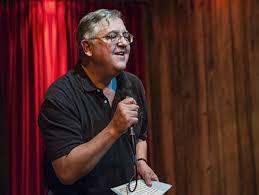 You joined the Essential class of 1980. What drew you to the organization?
You joined the Essential class of 1980. What drew you to the organization?
In 1979 what drew me to the organization was probably Pike Powers. There were a couple of folks I was close to who were either involved in organizing Leadership Austin or who were a part of the first class also. I was close to Pike and had been involved with some projects with him. He pushed me to get involved with Leadership Austin and I’m glad I did.
In this town we have an attitude of being progressive…as in forward looking, inclusive and open-minded. Despite that we still tend to seek out people like ourselves, which is one of the good things about Leadership Austin. They do a good job of diversifying and bringing people together from different communities and giving people a chance to work with each other.
Tell us about that very first year of Essential?
Leadership Austin in the first year was very much focused on moving throughout the community–physically moving through the community. We would go visit the jail, go on tours, meet with people who you wouldn’t otherwise get to meet.
A lot of the more engaging, interactive aspects of Leadership Austin weren’t in place at that point. That said, I learned an extraordinary amount about Austin and Central Texas. I met a great group of people–a lot of whom are still key.
How would you describe your leadership style?
Collegial, participative. I like an organization where everyone participates. I like an organization that’s flat. I like an organization that works well interdepartmentally, which means there’s not a rigid hierarchy structure in place.
I’m probably a little more tactical than strategic. I like to think I’m more strategic but I usually find myself dealing with things that are way more tactical. I enjoy the collaborative process.
Have you changed through the years?
I’ve always been a staff guy. Even now, running an organization I basically view myself as one of the staff that serves the board and the community. As a consequence I’ve always preferred working in groups and teams.
I don’t think I’ve changed a lot. I’m probably less certain of myself now than I was 20 or 30 years ago. I probably question myself more. I’m probably a little more empathetic. Because I was more certain of where I was going and what I was doing, I was probably less understanding of why someone might not want to go that way.
Any advice for emerging leaders?
One of the challenges you have is to make sure you’re not only listening to people who sound like you. That relates to what media you consume, it relates to your peer group, it relates to your community involvement.
It’s easy to only hear things from people who share your political viewpoint; it’s easy to only eat food from one cuisine; it’s easy to only go to certain kinds of movies. You can apply that to almost everything, but understanding and being able to have a sense of what others who aren’t like you are doing/believing/feeling is a critical thing.
Otherwise, the best advice anyone can give is to keep at it. Winston Churchill: “Never never never give up.” I don’t know what else one can say to a young leader because if you’re really a young leader you probably have it all figured out. It’s not until you’re 60 that you realize you didn’t.
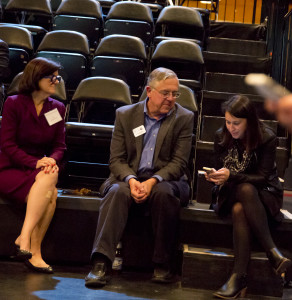 Do you have different advice for established leaders?
Do you have different advice for established leaders?
If you’re an experienced leader you’re probably well settled in to your mode. It’s either worked for you or it hasn’t. I suspect if you’re defined as a leader when you’re older, it’s working.
I tend to be the linear guy in a group of non-linear people, which is why collaboration is important. You can’t impose something on people who are creative and by their DNA anti-authoritarian in many ways. So that’s worked well for me. But to presume that I would tell someone else who’s established their own style and structure things they ought to do….I wouldn’t presume that.
Except for the part about making sure you listen to different worldviews. That’s part and parcel to our inability to bring people together and talk across aisles. Senior leaders, elder leaders have a real responsibility to do more to be the peacemakers and the bridge builders.
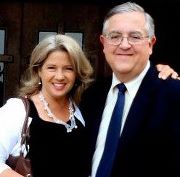 What’s your favorite thing about Austin?
What’s your favorite thing about Austin?
Austin is a city that’s willing to try anything and as a consequence I never really bored in Austin. I feel like you can cross over and do different things, experience different environments and you are never shut out of anything. Austin’s just a very comfortable place for me to be. It always has been.
What do you think Austin needs right now as a community?
Oh lots of things: we need to do something about the suburbanization of poverty; figure out how to manage gentrification in a way that doesn’t drive people out of neighborhoods; we need to do something about continuing to bridge the digital divide; we need to do something about our traffic. We need to do something about the guys that are standing on street corners, whether it’s better mental health services or whether it’s homelessness. We need to…there are so many things.
Does that list overwhelm you?
No. Few things overwhelm me. One of the things about this organization, being a media organization and having a pulpit…it’s difficult to define how to optimize that pulpit for what it is you want to do. KLRU over the years has done a great job at arts and culture. We have done a lot in education. Over the years we’ve been up and down in public affairs and community issues. We are about to start expanding and enhancing our public affairs initiatives. That’s the one where some thought and consideration has to go into it to avoid being overwhelmed. There are so many things you can do and so many things you can discuss and so many directions you can go.
As a media organization, what you become is more like a policy gadfly…you’ve got to be ready to move from one policy area to another. It means the effort we’re really sustaining is storytelling…because that’s really what we do. We use storytelling to make issues visible, positions visible, and perhaps create some increased awareness that will lead someone to drive the issue further down the field after we’ve moved on to do something else. That’s really what news does.
To be able to move from issue to issue and expose ideas and challenges, it’s the greatest thing in the world to have that opportunity. Which is why, when you asked that question what’s surprising about my day…Every day really is different.
One day you’re dealing with a music program; the next day you’re dealing with some federal funding issue; the next day you’re trying to figure out how to build a civic summit; next you’ve got a documentary filmmaker who’s trying to launch something…it’s a terrific, terrific job.


